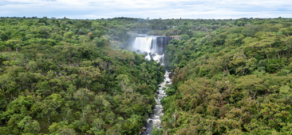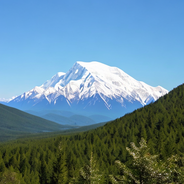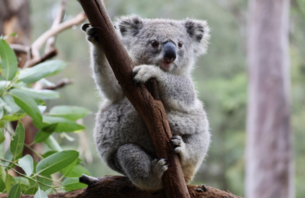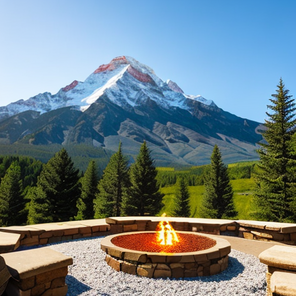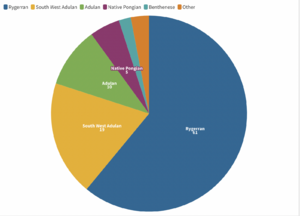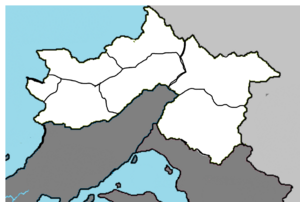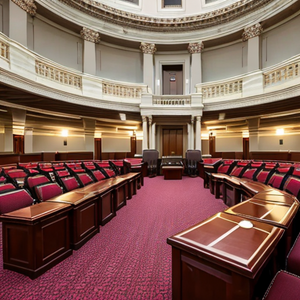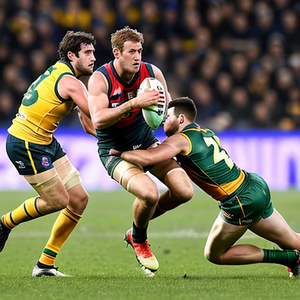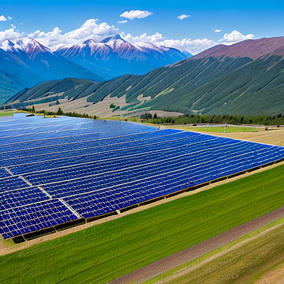Pongi
Federation Of Rygerrof Kauua-Woi | |
|---|---|
|
Flag | |
| Motto: "Standing United Together" | |
| Anthem: Forever Pongian | |
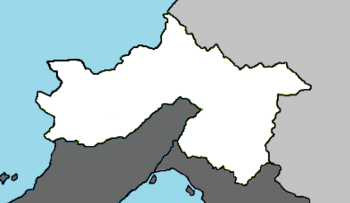 Map of Pongi | |
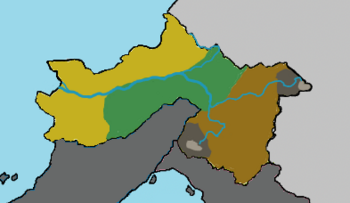 | |
| Capital | Monsvallis |
| Largest City | Rygerrof City |
| Official languages | Rygerran |
| Recognised national languages | Rygerran, Portuguese |
| Ethnic groups | Rygerran |
| Demonym(s) | Pongian |
| Government | Parliamentary Republic |
• Prime Minister | Bretford Rintt |
• Governor of the Unions | William Etwyaip |
| Legislature | The Pongian Parliament |
| Senate | |
| Assembly | |
| Establishment | |
• Territory Formed | 1677 |
• Treaty of Mitangi | 1823 |
• Independence | 1929 |
| Area | |
• | 406,752 km2 (157,048 sq mi) |
| Population | |
• 2024 estimate | 9,425,000 |
• Density | 22.932/km2 (59.4/sq mi) |
| GDP (PPP) | 2024 estimate |
• Total | 366.7 Billion |
• Per capita | 38,904 |
| HDI (2023) | .870 very high |
| Currency | Pongian Tremarra (PTR) |
| Time zone | UTC-11:00 (Pongian Standard Time) |
• Summer (DST) | UTC-10:00 (Pongian Daylight Time) |
| Date format | DD/MM/YY |
| Driving side | left |
Pongi, officially known as The Federation of Rygerrof, is a sovereign state that borders Iobaray to the south, Alluna to the south-east, along with a western coastline against the Elborra Bay. Pongi has 7 states, including the Pongian Capital Territory. The states are Bareka'i, Warrung, Pranorte, Gorges, Trevas and Paisaje.
Areas around the nation were first settled forty thousand years ago, with two distinct nations and cultures, who lived peacefully until Euronian arrival. Pongi was found following the combination of the Kauua and Woi nations in 1677, after the Western Stockade. It was part of the Iobaray Empire from 1824 to 1928, before the revival of the nation from socialist wasteland to a new, lively federation after development.
Etymology
The name Rygerrof was derived from a word in the Woi language group being "cliff side." Euronian settlers & The Woi people during independence promoted that name, due to the abundance of sandstone cliffs off the Pongian coast. It was chosen as the official government country name after a national referendum, with the alternatives as "Pongi", "Lerkert" and "Serayta", which were also derived from indigenous names. Eventually, the name Pongi stuck as an unofficial name and has been recognised as an official name of the nation. Pongi was derived from a word in the Kauua-Barekay language group meaning "great lake."
History
Pre-Colonial
Pongi was home to several different groups of people during ancient periods, mainly indigenous locals who were spilt in two groups, the Kauua and the Woi peoples, who were split into smaller groups. They mainly controlled their own land, with the Woi peoples residing west of the Kawisena Valley, on the flat forested plains around Monsvallis from around 40,000 years ago. However, the Kauua peoples inhabited high, mountainous and untouched land. Both groups settled in the area surrounding Pongi around forty-five thousand years ago. Some of the oldest rock carvings and stone dams were built high up in the mountains while fossil carving was also popular with the coastal Twashare tribe, part of Woi Nation. Indigenous Pongians were known for being hunter-gatherers, who had classified systems of hierarchy and geography.
Settlement
Pongi was first settled in 1599, with explorers coming from the south making friendly contact with the Indigenous populations, which gradually transformed Cape Conran as a meeting place between southern traders and the native peoples. However, the first overseas contact came in 1677, with Euronian settlers engaging in a horrific battle with the Kauua indigenous nation. This would be called the Western Stockade, as the battle happened around Monsvallis, where Euronians had settled. Thousands of native peoples were killed in some of the biggest acts of violence the nation had seen before. This resulted in Eastern Euronian & Northern Ausianian peoples splitting up the land after a victory, combining the two nations and relegating the native peoples to the bottom of the social ladder. This proved to have huge complications for indigenous Pongians in the future, as their land was forcefully taken. Through strong anti-labor sentiment however, the native peoples slowly gained more rights as they consisted of ninety percent of the population. Before accepting the Treaty of Mitangi in 1824, the nation had undergone a change from remote settlements to useful farmland for settlers.
Independence
Pongi was part of Iobaray for over one-hundred years as the new Territory of Rygenrof evolved further to form a key component in the empire's agricultural supply. Many Pongians felt disconnected as a collective and pushed for independence, however quashed down multiple times by the relentless socialist government. Eventually, the empire fell in 1928 after an economic revolution and collapse, which led to the forming of three new nations within the area. Pongi kept lots of government ministers from the former empire, and proceeded with a socialist system. The author of the constitution, Mark James Terett wanted further perspective and sought out opinion from former representatives, assembly members and most importantly, Native Pongians. This safeguarded their culture for centuries to come, and was a good example of co-operation between the Euronians and the Indigenous Pongians.
Pongian Revolution
In 1956, discontent for the Menance government uplifted as many unpopular policies were enacted. Elections were previously a far cry and her government was corrupt. Mass protests broke out across the nation, for the government to upgrade infrastructure and to respect the rights of indigenous people, as illegal national mining had been carried out in sacred sites, leading to the 1957 Fejina Rock Shelter Scandal. Needless to say, the government was extremely unpopular, which led to a massive coup attempt supported by almost all people. This was done to advocate for a fair and democratic government, and to oust Meanace. The army stormed the capitol, taking over rule before instilling an election and a new leader. Meanace was jailed for life, and there was a slow transition from socialism to social democracy. The new, underdeveloped nation still had lots of work to do, solving hunger and restarting the economy were top priorities for decades to come.
1961-1999
The new government, voted in many changes to the Pongian system, allowing for free and fair elections. But the lack of economic management from the ruling parties led to the 1959 crisis, where there was no industry within Pongi. There was no progress, and the government was stuck on ideas, before they realised tourism would bring in much needed money, along with energy. This was soon the start of the rebuild the nation had to go through to achieve success.
Some massive achievements from this time period is the brisk redevelopment of Pongi, upgrading infrastructure , public transport and improving education access to all. Improving literacy rates and infrastructure were main aims of the parties, as both main parties co operated together into the rebuild of Pongi, which strengthened the judicial system. By the 1990s, Pongi had somehow got most of the nation out of poverty, and had placed a bid for the 1999 Womens World Cup, which was a three bays world cup. The bid was successful, proving Pongi as developing hopefuls and growing national unity between the regions. However, there were still many sets of challenges for the emerging nation, as tourism was constraint to lowly infrastructure and poor spending had placed Pongi into deep debt, which is still an issue the nation manages today. There were no significant spending in the past eight out of ten budgets, showing that the government had indeed overloaded the economy and interest rates remained high.
2000-Present
The new millennium was a large turn for a highly developing nation, which had just hosted a very successful womens world cup, followed by multiple spending increases which boosted tourism to Pongi. Public education was at an all time high and new solar plants were constructed using Pongian materials, a pionner in renewable energy for Adula. This period brought a large change to the political landscape, with parties slowly dividing and taking contradicting stances. The 2 main parties have not appeared in the same coalition since 1987.
Pongi took leaps in poverty control, improving welfare and social housing for all. This has meant reducing wage gaps between men, women and different races. It put many things into stimulus, including the economy. Around this time period, most signs of the coup had been abolished within the political system. A flag change was presented as a referendum, with Pongians ditching the 1950's anchor mountain flag with a new navy ensign. The changes go effect on July 31st, 2023 and marks a new chapter in the nation's history.
Geography
Pongi is located in Southwest Adula, with a significant coastline alongside the Elborra Bay. The coastline is often jagged from erosion and a large area is protected under national park status. The four largest cities are located in either small bays or peninsulas. Short mountains run almost immediately down the Pongian coastline and are often considered to be a striking geographic barrier between the coasts and inland areas. The inland areas are defined by a "bowl" shape, where a large temperate forest resides. There is an elevation difference on three sides, as the lower bowl heading south. The difference is sometimes over 200m in height, in which water often flows into the forest below. Pongi's largest river is the Rygerrof River, which flows almost directly in the middle of the nation. It is a navigable channel up to Barcampa and is considerably important in transporting goods into the basin below. The river originates from Mt Rygerrof and Mt Mosatt, as it splits into a blue branch and a white branch. A significant amount of Gorges & Paisaje is located on a varying plateau, which stretches from the northern side of the nation to the far-south. The plateau sits around seven hundred metres high. Mount Rygerrof is Pongi's highest mountain, standing at 3,127 Meters. Pongi is also slightly affected by earthquakes, sitting near a tectonic boundary. The last major earthquake in the nation was the 2001 Westerliea Earthquake, impacting the coast next to the Rygerran Peninsula.
Climate
Pongi is geographically diverse in climate, with mediterranean coasts, inland subtropical forests and high, continental mountain ranges. Pongi's sheltered position along the Elborra Bay provides a 'bay effect' where the area surrounding the bay is warmer than other surrounding areas. The coasts are relatively mild and have significant oceanic influences. The mountainous areas part of eastern Pongi are often defined with a colder climate, which is almost continental. Ocean currents have a significant effect on Pongi's climate, as it is mild. There are large temperature and rainfall pattern differences between the coasts and inland climates. The eastern plateau gets significant amounts of snow each year, and a large part is protected land.
| Climate data for Monsvallis, Pongi | |||||||||||||
|---|---|---|---|---|---|---|---|---|---|---|---|---|---|
| Month | Jan | Feb | Mar | Apr | May | Jun | Jul | Aug | Sep | Oct | Nov | Dec | Year |
| Record high °C (°F) | 36.8 (98.2) |
38.1 (100.6) |
34.4 (93.9) |
31.8 (89.2) |
29.1 (84.4) |
26.4 (79.5) |
23.9 (75.0) |
22.7 (72.9) |
28.5 (83.3) |
29.9 (85.8) |
31.9 (89.4) |
33.4 (92.1) |
38.1 (100.6) |
| Average high °C (°F) | 25.7 (78.3) |
26.1 (79.0) |
25.1 (77.2) |
21.8 (71.2) |
18.9 (66.0) |
17.2 (63.0) |
15.7 (60.3) |
14.1 (57.4) |
16.3 (61.3) |
20.1 (68.2) |
22.0 (71.6) |
23.9 (75.0) |
20.6 (69.1) |
| Daily mean °C (°F) | 20.8 (69.4) |
21.0 (69.8) |
20.1 (68.2) |
17.2 (63.0) |
14.5 (58.1) |
12.1 (53.8) |
11.2 (52.2) |
10.1 (50.2) |
12.5 (54.5) |
15.5 (59.9) |
17.6 (63.7) |
19.3 (66.7) |
16.0 (60.8) |
| Average low °C (°F) | 15.9 (60.6) |
15.9 (60.6) |
15.0 (59.0) |
12.1 (53.8) |
9.5 (49.1) |
8.1 (46.6) |
6.0 (42.8) |
6.7 (44.1) |
8.7 (47.7) |
11.0 (51.8) |
13.1 (55.6) |
14.7 (58.5) |
11.4 (52.5) |
| Record low °C (°F) | 10.2 (50.4) |
8.8 (47.8) |
8.1 (46.6) |
7.7 (45.9) |
4.9 (40.8) |
2.5 (36.5) |
1.8 (35.2) |
1.1 (34.0) |
2.2 (36.0) |
6.5 (43.7) |
8.4 (47.1) |
9.2 (48.6) |
1.1 (34.0) |
| Average precipitation mm (inches) | 1.9 (0.07) |
17.4 (0.69) |
39.7 (1.56) |
61.1 (2.41) |
86.2 (3.39) |
98.9 (3.89) |
107.7 (4.24) |
106.4 (4.19) |
96.2 (3.79) |
57.8 (2.28) |
15.5 (0.61) |
2.6 (0.10) |
691.4 (27.22) |
| Source: The Pongian Bureau of Climate and Environment | |||||||||||||
Flora & Fauna
Pongi is home to a variety of different plants and animals. The national animal of Pongi, the little penguin, is native alongside the entire coastline of the nation and sets up nests in protected breeding areas alongside the coast as they migrate to Antartique. The Koalae is also native within the forests of the nation, however it has been impacted by climate change. Red Gums sit high into the deep forest along with many grass shrubs as flora enjoy rainfall all year around. Some other notable animals that reside in Pongi include the Kangora and the Loud Parakeet, which is one of Pongi's most known animals and a pride for Pongian patriotism.
Demographics
Religion
Pongi is host to many different religions and cultural practises. Most people in Pongi are irreligious, however there are many native religions that share stories about Pongi's history. The largest religion is Ancherism (which is an unofficial name), and around 25% of Pongians believe in it. Ancherism is a native religion and is accepting of all peoples. There are also small amounts of churches and mosques within the nation to provide for immigrants.
According to the 2023 census, 55% of Pongi's population state they do not believe in any religion. 25% believe in Ancherism, 7% believe in other native religions as stated, 6% believe in Christianity, 5% believe in Islam and 1% believe in other religions.
Population
Pongi is a multicultural country, with many immigrants coming from nearby countries in Adula. Around 30% of Pongians have 1 parent that was born outside of Pongi. The main ethnic groups are Rygerran and other South-West Adulan. The main ethinic groups coming outside the former Iobaray Empire borders are of Euronian desent. Ethnic Rygerran people consist of 68% of the population, whilst South West Adulan people consist of 14%. Other Adulan peoples make up 8% of Pongi's population. The largest group outside of Adula is from Euronian and Benthenese origin, with 7% combined.
Pongi's has a population of 9.38 Million people, according to the 2023 Census. The Census is conducted every 5 years to calculate the amount of people residing in Pongi. This marks a massive growth from the previous 2018 census, which came in at 8.9 million.
States
| State | Postal abbrev. |
Capital | Population | Representative Districts | Assembly Members |
|---|---|---|---|---|---|
| Pongian Capital Territory | PCT | Baluka'i | 1,890,000 | 6 | 36 |
| Warrung | WRU | Rygerrof City | 2,730,000 | 9 | 52 |
| Pranorte | PRA | Baranbay | 1,120,000 | 4 | 21 |
| Bareka'i | BAR | Oakpalm | 1,270,000 | 4 | 24 |
| Trevas | TRE | Brabram | 790,000 | 3 | 15 |
| Paisaje | PAI | Mosatt | 710,000 | 2 | 14 |
| Gorges | GOR | Barcampa | 915,000 | 3 | 17 |
Government
Legislature
The Pongian Legislature must uphold the Pongian Constitution when making new laws, and is the founding document of Pongi. There are two houses in the Legislature, the upper house is called the Senate, and the lower house is called the Assembly. Pongi's government is fully secular, which is stated in Article 9 of the Constitution.
The Senate was established in 1953 after the uprising to hold the government accountable and now is a grand symbol of democracy. The chamber contains 90 seats. After a bill is passed through the Assembly, the Senate receives it and debates extensively to ensure the bill is thought through.
The Assembly is the lower house of the Pongian legislature. Established in 1923 during Pongi's founding, its role is to introduce new laws for the senate to pass. A majority is needed for a bill to move on. The chamber contains 360 seats.
The Governor of the Unions is a ceremonial role voted by the parliament and all candidates are politically neutral. This role is almost always ceremonial, however they administer the oath of office to all parliament members, sign all new legislation into law and attend international diplomatic events. Currently, William Etwyaip is the first Governor of the Unions to be of Indigenous Pongi descent, coming from the Ensvellp Tribe in Northern Pongi.
Rygerran Alternative currently hold the prime ministerial position after the election of Bretford Rintt in 2022. This is the first time that Alternative have held the prime ministerial position. The governor of the unions is sworn in by the current prime minister and serves for a maximum of 2 prime ministerial terms.
Elections
In Pongi, the government is democratically elected, with runoff preferential voting used across all districts. In the National Assembly, 180 seats will go to the local member of parliament, which represents local areas individually. There are dedicated districts and MPs serve the local community. Each federal term in Pongi lasts for three years, and the prime minister may declare the election date. However, in council and state elections, fixed dates are set for elections, once every 4 years. In addition, the Senate is the upper chamber of the Pongian parliament. The nation is split off into the same 30 distinct voting districts, and in states there are often multiple people running. Each large district votes for two senators and 6 representatives. A third senior senator contests every two terms. This senior senator is rotated every election cycle. The representative tally is determined by the percentage of vote received and the amount the individual acquires. The other 180 representatives are elected this way, and anyone in the Assembly can become Prime Minister. Both the Assembly and Senate have term limits; the Assembly with twelve year limits and the senate with a four term limit including one super term totalling 16 years. By-elections must be called if the representative exceeds their term limit, with the exception of the Prime Minister (see below.)
Prime Minister
The Prime Minister, Bretford Rintt is part of the Alternative Party, representing Congwarrang North in the House of Representatives. He was elected in 2022 and is set for reelection in 2026, after a special election was held in September 2023.
The Deputy Prime Minister, Ranford Tarran is part of the Patriot Party, representing Mosatt Hills. The alliance between the Alternatives and Patriots ensure that they hold the Deputy position.
There are no term limits for the Prime Minister, however they must follow the Assembly's term limits of twelve years maximum in the chamber. They are allowed to serve the rest of the term if the limit expires before the next election.
Foreign Relations
Pongi has many diplomatic relations with different countries on Iearth. Monsvallis is home to multiple embassies overseen by the Pongian Government. After development, Pongi has opened up with many nations across the world and strengthening its ties with neighbours. Pongi advocates for the democratic process, enviromentalism and personal freedom. Pongi's international relations have been guided by their main policies of common sense, multilateralism and respect for other nations. Bentho is Pongi's closest ally, thanks to similarities in government, historical relations and global events.
Military
Due to a relatively peaceful relationship with neighbours along with the remote location, Pongi does not have a large military. However, the Pongian Armed Forces is the main operating arm of the military, which was founded in 1931 after the collapse of the Iobaray Empire. This in turn built up a medium sized army, with a commanding amount of naval ships and fighter jets. Pongi has struggled significantly with the recruitment of people to the army, but with new university incentives and a free degree on offer, numbers are rising. Topping over 200,000 combined soldiers, in which around 50,000 are currently active, Pongi may have the means to fortify itself enough incase of an invasion.
Pongi contains many types of new equipment to replace ageing carriers, aircraft and tanks. The Pongian Navy patrols Pongi's section of the Elborra Bay, which is easily one of the largest navies in the region, even without a waterfront position. The Navy also has 1 Aircraft Carriers, rightfully named the RTs Commander. The Army Force patrols Pongi's borders with international neighbours, keeping peace within the SW Adulan Region. This includes mandatory patrols of the high mountains, installing new equipment across the plains and training soldiers to help with combat duties. The Pongian Air Force was founded alongside the navy in 1936. The nation is also a member of the PADC, joining on the 11th of July, 2023
The army will serve, protect, uphold Pongian values and the integrity of the constitution, as defenders of the land.
Culture
Sport
There are many different sports within Pongi. Usually, there are a few main sports vying for country dominance, in which it has become an interesting tussle between the main football codes. There are many casual sports that Pongians do. This may include surfing, volleyball and skiing, or maybe team sports like Pongipush.
Pongipush is popular within the north of the nation. It is known for its renowned intensity in contest and free flowing game out. There is a league called the National Pongipush League and many lower leagues. Pongipush has expanded into other nations as immigrants bring the game with them.
Rugby Union is Pongi's 2nd most popular sport. The Pongian Rugby Team placed 4th in the 2023 overall ranking, and the Pongian Rugby League hosts games from Feburary to July each year.
Soccer is one of the most popular women's sports. The nation has a strong women's world cup team, and since the 1999 Women's World Cup, participation rates have skyrocketed. Now the Pongian Sporting Association has launched the Men's League with players from various state associations.
Art
Pongi has a cultured art industry, being home to many famous painters and digital artists. Art is known to be a meditation form in Pongi, as it is supposed to help you relax. There are many famous paintings scattered within the nation, but the most famous is a painting made by Carlos Tenzwer, which is a painting of Pongi's 2 national animals, the little penguin and the snow leopard, representing 2 different areas in unity.
Cuisine
A traditional dish is the Gum Leaf and Raspberry salad, typically served at traditional Pongian restaurants. There are also many other local dishes which include curries and barramundi, which are often famous overseas. Fish is an integral part of the native Pongian diet. Pongi specifically creates lots of fusion dishes with other nations and cultures which is a proud testament to Pongi's newfound openness with the rest of Iearth
Economy
Pongi's economy has mainly taken on a form of social democracy, a branch of socialism associated with capitalistic freedoms. After tax and trade reform made by the Rintt government, the previous socialist policies were abandoned or loosened to account for the ever changing world of globalisation. Businesses are now often incentivised to expand and free market policies are becoming widespread, however progressive tax policies remain as an equalisation measure to ensure the economic market stays within government control.
Trade
Exports consist a significant part of Pongi's economy, with manufacturing (such as mechanical equipment and transport vehicles) being the largest export, followed by agricultural exports. Mining is also a significant part of the Pongian economy, with mostly rail ballast and metals such as lithium abundant in the nation. These goods adds a significant amount of money into the Pongian economy, with manufacturing alone generating a significant amount of the nation's economy. With a wide coastline, Pongi hosts significant container ports, which the largest is Rygerrof City.
Energy
Pongi is a small Adulan nation known for its early sustainable energy commitments. Alpine Solar is a government-owned company, witch supplies solar panels to buildings around the nation, along with setting up new solar farms in the mountains. In the year 2019, the former Labour government set a new net zero goal of 2036, with installing new wind and solar projects. In 2019, the most predominant energy source was solar power, which accounted for 71% of total energy supplied. Wind power provided 16% of total energy, as other renewable sources (eg. hydropower and geothermal) totalled 9%. Non renewable gas constituted a total of four percent of hydrocarbons such as coal and gas, which are needed to keep operating heavy industrial plants. Those plants are in the process of transitioning to sustainable energy, such as geothermal.
After the latest election, the new government sought to move forward the net zero goal to 2031 as an election promise and to further increase battery efficient systems. Implementing a strict carbon tax from 2022, all forms of greenhouse gases released by anything other than heavy industry will concur large fines. The government has however upgraded general infrastructure, such as public transport and incentives for battery vehicles. Alpine Solar is considered Pongi's most recognisable government owned company, which builds solar panels in South-West Adula and sponsors large sporting teams.
Due to the urgency of climate inaction, Pongi focused on inventing newer, renewable ways to power heavy industry. Helping citizens cover costs for new energy-efficient solar panels and water systems, it is known as an effective and popular solution for many older houses in the nation. All residential and commercial emissions have been officially eliminated as of November 2024, with larger industries going carbon free by the set date of 2029. This scheme has helped not only Pongi's push towards renewables, but to saving endangered flora and fauna which are impacted by the effects of heavy industry.
Transit
Pongi contains a large, self built public transportation network, boasting giant train and streetcar systems across the nation. The country in particular is a significant train and tram builder, which contributes to the nations economy. Government subsided companies like Pongian Rail build sustainable and environmentally friendly commuter transport, highlighting the history of rail transit and the nation's efforts to stay within local boundaries when coming to public transit is commendable. Pongi has a long and proud history with rail, as the bayside location of the country made it a feeder for many inland Adulan countries trading via the oceans. There is a complex web of different public transit systems which serve many cities and the countryside.
Pongi has a host of high speed rail systems, linking to most cities and towns in the nation. A government agency called Trainslink manages all trains throughout the nation, including special high speed rail lines which were locally built. High-speed rail in Pongi contains multiple lines, the most busy being the Bays High Speed link, which connects Rygerrof City with Monsvallis and runs at superior frequencies. Rygerrof City, Monsvallis, Barcampa and Oakpalm all have extensive commuter rail systems which serve millions of passengers each day.
The Baluka'i-Pongiville International Airport is the largest and busiest airport in the country, boasting three state of the art terminals and is the main entrance for many visitors over the entirety of Iearth. The airport is the hub for Pongi Air and serves both international and domestic locations. The Warrung Coasts Airport complements Balukai Pongiville as a secondary location, albeit slightly less busy.
Tourism
Tourism is a huge sector of Pongi's economy, contributing to the continued growth of the nation and its development. The nation is fortunate to contain precious landscapes, natural beauty, a wide range of cultural heritage and being the heart of South-West Adula. Pongi has become a premier tourist destination, mainly known for its uniqueness and diverse range of geographic features. The industry generates significant amounts of money for the government and creates new job opportunities.
As a key pillar of the economy, Tourism generates around 3 billion tremarras per year, accounting for a small yet significant portion of Pongi's GDP. It is known that tourists boost economic growth, especially in regional areas, as they spend money which helps businesses around the nation.

